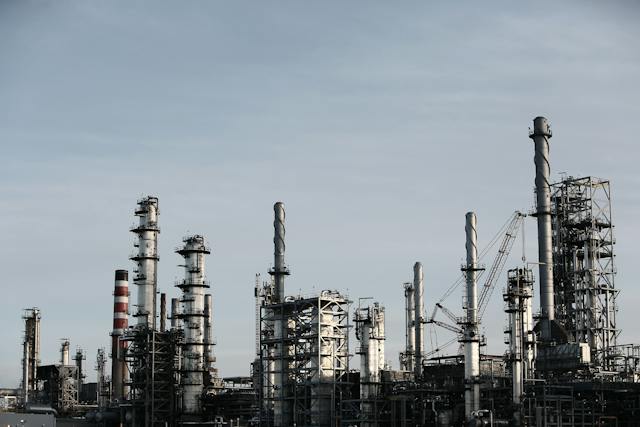Are you considering a career in oil gas transmission and wondering if it’s the right path for you? The oil and gas industry has long been one of the most lucrative and impactful sectors in the world. However, it also comes with its own set of unique challenges and hazards, making it crucial for you to weigh the pros and cons before pursuing a career in this field. In this blog post, we’ll explore the pros and cons of working in oil/gas transmission, and help you make an informed decision about whether it’s the right career path for you.
When it comes to working in the oil/gas transmission industry, it’s important to be aware of the dangers that come with the job. From working with highly flammable materials to the risk of explosions and fires, there’s no denying that this field can be hazardous.
However, if you’re someone who thrives in challenging environments and is committed to safety protocols, the rewards of a career in oil/gas transmission can be substantial. To explore this further, check out our latest blog to clear your mind in choosing the best career for you.
Key Takeaways:
Lucrative Industry
Oil/Gas transmission offers high earning potential, making it a financially rewarding career choice.
Job Stability
The demand for oil and gas is constant, providing job security in the transmission industry.
Technical Skills Required
The career path requires proficiency in technical skills such as engineering, maintenance, and operations.
Environmental Concerns
As the industry is often scrutinized for its impact on the environment, individuals considering this career path should be mindful of the environmental implications.
Growth Opportunities
With advancements in technology and the need for sustainable energy solutions, there are ample opportunities for career growth and development in the oil/gas transmission sector.
Understanding the Basics of Oil Gas Transmission

Any individual considering a career in oil/gas transmission should first have a clear understanding of the industry basics. This includes understanding the processes involved in the transmission of oil and gas from production sites to refineries, distribution centers, and ultimately to consumers. It also involves understanding the various components of the transmission infrastructure and the regulations that govern the industry.
Definition of Oil/Gas Transmission
Oil/gas transmission refers to the transportation of crude oil and natural gas from production facilities to processing and distribution centers. This process involves the use of pipelines, tankers, and other transportation modes to move these valuable resources over long distances. It also includes the storage and handling of these resources at various intermediate points along the transmission route.
Role and Importance of Oil/Gas Transmission Industry
The oil/gas transmission industry plays a crucial role in ensuring that energy resources are efficiently and safely transported from production sites to the end consumers. Without the infrastructure and expertise provided by this industry, the reliable and continuous supply of crude oil and natural gas would be compromised, leading to potential energy shortages and economic disruptions.
The industry also contributes significantly to the economy and job market by providing employment opportunities and supporting related sectors such as manufacturing and transportation. In your career in oil/gas transmission, you will be responsible for maintaining the integrity and efficiency of the transmission infrastructure, ensuring that the resources are transported safely and in compliance with environmental and safety regulations.
It is essential to understand the critical role this industry plays in supporting global energy demands and economic stability. Your expertise and dedication will directly impact the reliable supply of energy resources to consumers, making your role in the industry vital and impactful.
Requirements of a Career in Oil/Gas Transmission

Lastly, it is important to understand the requirements and qualifications necessary for a career in oil/gas transmission. This industry demands a unique set of skills, educational qualifications, and experience, as well as licensing, to ensure safety and efficiency in the transmission process.
Skill Requirements
One of the most important aspects of a career in oil/gas transmission is the possession of strong technical and problem-solving skills. As a transmission professional, you must be able to troubleshoot and address complex issues that may arise in the pipeline systems. Additionally, attention to detail and the ability to work effectively under pressure are crucial as you may encounter high-stress situations that require quick decision-making. Good communication and teamwork skills are also essential as you will often be working with a team of professionals to ensure the safe and efficient operation of the pipelines.
Educational Qualifications
When considering a career in oil/gas transmission, it is important to note that a high school diploma or equivalent is typically the minimum educational requirement for entry-level positions. However, obtaining a post-secondary degree or certification in a relevant field such as engineering, mechanical technology, or industrial maintenance can significantly enhance your employment prospects and potential for career advancement within the industry. Additionally, ongoing professional development and training programs are often available to keep you up to date with the latest technologies and best practices.
Necessary Experience and Licensing
In addition to possessing the required skills and educational qualifications, gaining hands-on experience in the field is crucial for building a successful career in oil/gas transmission. Some employers may require a certain number of years of experience in a related field before considering you for a transmission position. Furthermore, obtaining the necessary licensing and certifications is a key component of working in this industry.
This often includes certifications in pipeline inspection, safety training, and potentially even commercial driver’s licenses depending on the specific role you are pursuing.
Exploring the Various Job Roles in Oil/Gas Transmission Industry

Your career in the oil and gas transmission industry can take you down various exciting paths. Here, we’ll explore some of the key job roles within the industry, giving you an idea of the diverse opportunities available to you.
Operational Roles: Pipeline Operators, Technicians
These roles involve the day-to-day maintenance and operation of the pipelines and associated equipment. As a pipeline operator, you will be responsible for ensuring the safe and efficient transportation of oil and gas through the pipelines. This will involve carrying out routine inspections and maintenance, monitoring operating parameters, and responding swiftly to any operational issues that may arise.
Technicians play a crucial role in supporting pipeline operations. They are responsible for troubleshooting and repairing equipment, performing preventative maintenance, and conducting tests to ensure the integrity of the pipeline system. Both roles require a strong attention to detail and a commitment to following strict safety procedures.
Design and Planning Roles: Engineers, Analysts
Engineers and analysts are involved in the design, construction, and optimization of the pipeline infrastructure. As an engineer, you will be responsible for developing and implementing the technical solutions necessary to ensure the safe and efficient operation of the pipelines. This may involve designing new infrastructure, assessing the feasibility of new projects, and optimizing existing systems to maximize performance and minimize environmental impact.
Analysts, on the other hand, use data and modeling to support engineering and operational decisions. They analyze a range of factors, including flow rates, pressure, and environmental impacts, to ensure that the pipeline system operates effectively and complies with regulatory requirements.
Managerial Roles: Project Managers, Operations Managers
Managers within the oil and gas transmission industry play a crucial role in overseeing operations and driving strategic initiatives. As a project manager, you will be responsible for planning and executing major projects, overseeing budgets and timelines, and coordinating the efforts of various teams to ensure successful project delivery. Operations managers, on the other hand, are responsible for the day-to-day management of pipeline operations, including personnel, equipment, and safety protocols.
Both roles require strong leadership and communication skills, as well as a deep understanding of the technical and operational aspects of the industry. They also bring a high level of responsibility and the opportunity to make a real impact on the industry.
Monetary Aspects: A Look at the Employment and Salary Prospects

However, one of the most important factors to consider when evaluating a potential career path in oil/gas transmission is the monetary aspects, including the overall employment and salary prospects. It’s crucial to have a clear understanding of what the job market looks like and what kind of financial return you can expect from pursuing this career.
Job Market Statistics
The job market for oil/gas transmission professionals is relatively stable, with a growing demand for skilled workers to maintain and operate the infrastructure necessary for the transportation of oil and gas. According to the Bureau of Labor Statistics, the employment of petroleum pump system operators, refinery operators, and gaugers is projected to grow 3 percent from 2019 to 2029, which is about as fast as the average for all occupations.
Furthermore, as the current workforce continues to age, there will be an increasing need for new talent to fill the positions that become available due to retirement or other reasons. This presents a promising outlook for job seekers in the oil/gas transmission industry, with ample opportunities for those who possess the necessary skills and qualifications.
Average Salary and Benefits
When it comes to the average salary and benefits in the oil/gas transmission industry, the compensation can be quite lucrative, especially for those with the right experience and expertise. As of May 2020, the median annual wage for petroleum pump system operators, refinery operators, and gaugers was $71,540, which is significantly higher than the median wage for all occupations.
In addition to competitive salaries, many employers in the oil/gas transmission sector offer attractive benefit packages, including health insurance, retirement plans, and paid time off. Some companies also provide additional perks such as bonuses, profit sharing, and opportunities for career advancement.
Overall, the combination of a decent salary and comprehensive benefits makes a career in oil/gas transmission an attractive option for individuals looking to secure their financial future.
The Future of Oil/Gas Transmission as a Career Path

To continue your consideration of a career in oil/gas transmission, it’s essential to take a look at the future of the industry. While there are factors to consider, such as the impact of emerging technologies and sustainability considerations, it’s important to remember that the demand for skilled workers in this field remains high.
According to a study by Zippia, oil and gas production offers a variety of career paths that are in high demand, making it a potentially lucrative industry to pursue. And read our articles if you want to learn more about the potential careers like teaching, package cosmetics & goods, food industry to know what career best suits you.
The Impact of Emerging Technologies
As the oil and gas industry continues to evolve, the impact of emerging technologies is becoming more apparent. From automation and robotics to data analytics and artificial intelligence, these advancements are transforming the way work is done in the industry. While these technologies have the potential to increase efficiency and safety in the field, they also bring about the need for new skills and knowledge.
As you consider a career in oil/gas transmission, it’s important to be prepared to adapt to and embrace these emerging technologies. By staying informed and continuously refining your skills, you can position yourself as a valuable asset in the industry.
Sustainability Considerations and Career Longevity
With the increasing focus on sustainability and environmental responsibility, the oil/gas industry is also undergoing significant changes. There is a growing emphasis on reducing carbon emissions, minimizing environmental impact, and transitioning towards renewable energy sources. While these changes may present challenges, they also create opportunities for individuals with the skills and knowledge to navigate the evolving landscape.
By staying informed about sustainability considerations and exploring ways to contribute positively to the industry’s environmental efforts, you can position yourself for long-term career success. Additionally, the industry’s shift towards sustainability opens up new career paths in renewable energy and environmental management, offering further opportunities for career growth and longevity.
While the oil/gas transmission industry faces challenges and changes, it also offers a range of opportunities for those willing to adapt and grow with the industry. By staying informed about emerging technologies and sustainability considerations, you can secure a promising career path with the potential for long-term success and impact.
Advantages and Challenges of Choosing Oil/Gas Transmission as a Career
Despite the risks and challenges, pursuing a career in oil and gas transmission can offer numerous advantages. From job security to high compensation and growth opportunities, there are many factors that make this career path appealing. However, it’s important to also consider the potential challenges and obstacles that you may encounter in this field.
Advantages: Job Security, High Compensation, Growth Opportunities
One of the most significant advantages of working in oil and gas transmission is the job security that it offers. This industry plays a vital role in meeting the global demand for energy, and as a result, there is a constant need for skilled professionals to work in this sector. With the increasing demand for energy, particularly in developing countries, there is a strong likelihood that your skills will be in demand for the foreseeable future.
In addition to job security, a career in oil and gas transmission also typically offers high compensation. The nature of the work and the level of expertise required often result in competitive salaries and benefits for employees. Furthermore, there are ample growth opportunities within the industry, whether it be through advancement into management roles, specialization in a particular area of expertise, or opportunities to work on complex and challenging projects.
Challenges: Unforeseen Accidents, Health Risks, Regulatory Pressure
While there are many advantages to pursuing a career in oil and gas transmission, it’s essential to acknowledge the potential challenges and risks that come with this field. One of the most significant challenges is the potential for unforeseen accidents and incidents in the workplace. The nature of working with hazardous materials and operating in complex environments means that there is always a risk of accidents occurring, which can pose a threat to your safety and well-being.
Another significant challenge is the health risks associated with working in the oil and gas transmission industry. Exposure to chemicals, high-pressure equipment, and extended periods of physical labor can contribute to long-term health issues if proper safety measures are not consistently followed. Additionally, regulatory pressure from environmental and safety authorities adds another layer of challenge to the career, as industry standards and compliance requirements continue to evolve and become more stringent.
Conclusion
With these considerations in mind, you can confidently consider a career in oil and gas transmission as a promising and fulfilling career path. The industry offers stable employment, competitive salaries, and opportunities for career advancement. Additionally, the growing demand for energy worldwide ensures a consistent need for skilled professionals in this field.
Your talents and passion for problem-solving and innovation can thrive in the dynamic and ever-evolving world of oil and gas transmission. With the right education and experience, you can become an essential part of a vital industry that plays a crucial role in global energy supply and sustainability.
Ultimately, the choice to pursue a career in oil and gas transmission is a personal one. However, by carefully considering your skills and ambitions, as well as the opportunities and rewards of this field, you can confidently embark on a career path that aligns with your professional goals and aspirations. Your contributions to the industry can make a meaningful impact on the world’s energy infrastructure while providing you with a fulfilling and rewarding career.
People also asks – Is Packaged Foods a Good Career Path?
What is oil/gas transmission and why is it important?
Oil/gas transmission involves the transportation of natural gas and crude oil from production facilities to storage facilities and distribution points. It is vital for ensuring a steady supply of energy resources to meet the demands of consumers and industries.
What does a career in oil/gas transmission entail?
A career in oil/gas transmission typically involves working with pipelines, compressor stations, and other components of the transmission system. It may include responsibilities such as monitoring and maintaining pipeline infrastructure, ensuring compliance with safety regulations, and addressing any operational issues that may arise.
Is oil/gas transmission a stable and lucrative career path?
Yes, oil/gas transmission is known for being a stable and lucrative career path. The demand for energy resources continues to grow, and professionals in this field are essential for ensuring the efficient and safe transportation of oil and gas. This creates numerous opportunities for long-term employment and career advancement.
What are the educational requirements for a career in oil/gas transmission?
Many positions in oil/gas transmission require at least a high school diploma or GED. However, specialized roles may require an associate’s or bachelor’s degree in fields such as engineering, environmental science, or business. Relevant certifications and training programs are also beneficial for career development.
What are the potential challenges of working in oil/gas transmission?
Some potential challenges of working in oil/gas transmission include the physical demands of the job, exposure to outdoor elements, and the need to adhere to strict safety protocols. Additionally, the industry may be influenced by market fluctuations and regulatory changes, which can impact job stability and requirements. However, with proper training and expertise, these challenges can be effectively managed.

Author Bio
Brian Bertrand
Brian Bertrand is an experienced resume writer with over five years of expertise in catapulting clients to their dream jobs. Through collaborations with renowned freelance platforms and esteemed online resume service brands, he has carved a niche for himself by delivering personalized, top-notch resumes that encapsulate the very essence of each client’s accomplishments, skills, and character. Diligent in his approach, Brian’s innovative flair and unwavering commitment to his craft make him a trusted partner in the pursuit of professional success. With an insistent curiosity for diverse industries and career trajectories, Brian strives to ensure that each resume he creates stands out from the competition. Whether you’re an aspiring graduate, a career switcher, or a seasoned pro, Brian possesses the expertise to craft a resume that truly reflects your unparalleled value and potential.

